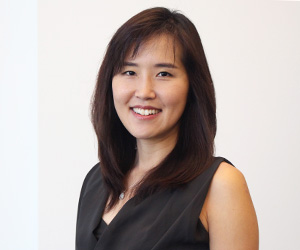Ahn
Dr. Sun Joo (Grace) Ahn

About: Dr. Ahn teaches undergraduate-level research methods, graduate-level user experience research, communication theory, and advertising and society. Her research examines how social media, video/internet games, and immersive virtual environments influence user attitudes and behaviors. She also directs the Center for Advanced Computer-Human Ecosystems (CACHE) lab.
Education
Ph.D., Communication, Stanford University
M.A., Communication, Stanford University
B.A., Communication/Business Administration, Seoul National University
Research Interests and Activities
Dr. Ahn is the director of the Center for Advanced Computer-Human Ecosystems (CACHE) lab. Her main program of research investigates how interactive digital media transform traditional rules of communication and social interactions, looking at how virtual experiences shape the way the way that people think, feel, and behave in the physical world. Her work has helped establish foundations for the theoretical advancement of virtual experiences in mediated environments and how their effects transfer into the physical world in four different contexts: health, consumer psychology, conservation, and education. Her ongoing work includes a NSF funded project exploring the application of virtual agents to promote STEM learning for children in informal learning environments, such as children’s museums. Her work has been published in a number of flagship outlets, including Journal of Advertising, Journal of Computer-Mediated Communication, Communication Research, Journal of Health Communication, Human-Computer Interaction, and Media Psychology.
Teaching Specialties
Dr. Ahn’s teaching specialties include advertising research, user experience research, advertising society, communication theory, media processes and effects, digital media technology, and communication and children.
Experience
Prior to obtaining her Ph.D. degree, Dr. Ahn worked as the Assistant Manager of the Survey & Research Division for the Korea Foundation for Asian Culture Exchange under the Korean Ministry of Culture & Tourism. She also worked as an interpreter and translator at the Korean Ministry of Finance & Economy and holds over a decade’s experience in interpretation and translation as a freelancer.
Awards and Fellowships
2019: AEJMC Krieghbaum Under-40 Award
2019: University of Georgia Office of Instruction First-Year Odyssey Teaching Award
2017: University of Georgia Charles B. Knapp Early Career Scholar Award
2017: AEJMC Emerging Scholar Grant
2017: Department of Advertising and Public Relations, Outstanding Teacher Award nominee
2015: Mary Alice Shaver Promising Professor Award, American Academy of Advertising
2015: Top Paper/Poster in the Health Communication Division, International Communication Association
2014: Top Paper in the Communication and Technology Division, International Communication Association
2014: Best Paper at IEEE VR 2014 Conference
2014: University of Georgia’s Superstar Researcher Recognition, Office of the Provost
2014: University of Georgia Career Center Faculty Recognition for high impact on student career development
2013: University of Georgia, Office of the Senior Vice President for Academic Affairs and Provost, Faculty Summer Support ($5,000)
2009: Top Paper Award in the Nonverbal Communication Division, National Communication Association
